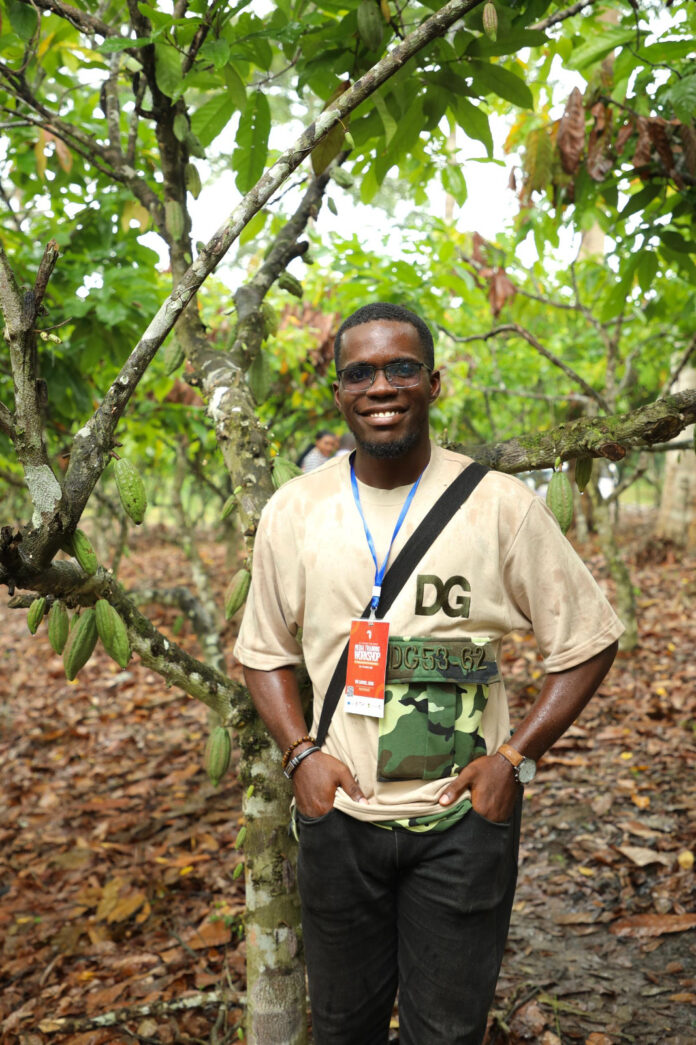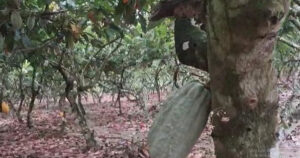According to International Cocoa Organization (ICCO) 2025 Bullet No.2, Africa contributed to 71% of world cocoa produced, followed by Americas with 23% and Asia and Oceania accounting for 6%. In Africa, Ivory Coast accounted for 36% of cocoa produced with Ghana contributing to 10%.
With the events of climate change, some experts in the industry are predicting a 10% decline in yield for the 2025/2026 cropping season. Ageing trees, rainfall patterns, continued rehabilitation programs, pest and disease infestation are expected to contribute to this decline.
One of the greatest highlights of the industry was in 2024. The cocoa sector experienced a historic surge in global prices on more than three consecutive occasions with December 2024 recording price at approximately US$12,900 per tonne. The industry began to see an ease in the surge in prices in 2025. According to Trading Economics, global cocoa price stood at US$8,256 per tonne in July 2025.
Effects of Regional Shortfalls
The surge in prices in 2024 according to industry experts was a result of supply shortages influenced by shortfalls in production levels largely in Ghana and Ivory Coast. The two countries contribute to more than 50% of the world’s cocoa, and a shortfall in production means a downward spiral of supply.
Cocoa and Ghana’s Economy
One cannot speak about Ghana’s economy without the mention of cocoa. One of the driving forces of the nation’s economy is the notable crop that has contributed immensely to the country’s economic fortunes. Cocoa remains a great foreign exchange earner for Ghana and many other countries.
According to the Auditor General’s report, in 2023, Ghana recorded a total of $1.73 billion in cocoa receipts, up by 37.5% from $1.26 billion. The commodity also contributed to 14.47% of the country’s total foreign exchange earnings at a whopping amount of US$11.99 billion.
As the second world’s largest producer of cocoa, the export of cocoa contributes greatly to the country’s currency stabilization and forex management. Moreso, increase in cocoa revenue also influences government intervention for farmer support and sustainability programs in the industry.
In 2025, the cocoa export revenue stood at US$1.84 billion between January and April, a significant jump in revenue during the same period in 2024 which stood at US$579 million according to the Bank of Ghana. This was attributed to the surge in global cocoa price amidst production and supply challenges.
Employment and Production Shocks
Across the cocoa value chain, the sector provides direct and indirect employment to 6.3 million Ghanaians, representing 35% of the country’s population. Among this group are over 700,000 smallholder farming families. This underscores the great commitment and strong focus required on the sustainability of the industry. The country in the 2023/2024 cropping season experienced a significant drop in cocoa production from 1 million tonnes to less than half million tonnes, threatening the sustainability of the sector, global supply trends, and livelihoods. This decline, according to COCOBOD officials, is linked to the presence of El Nino, rehabilitation of disease and moribund farms, illegal mining (galamsey) activities and smuggling of cocoa.
It is estimated that Ecuador contributing 9% to global cocoa production may perhaps overtake Ghana should the country continue to experience a dip in production putting Ghana’s position in cocoa production at risk.
Cocoa’s Role in Rural Development
The cocoa industry over the years has brought infrastructure development closer to rural communities in the form of education, health care, and clean water etc. Some cocoa growing communities have equally benefited from road infrastructure through the Cocoa Road Rehabilitation Program, an initiative by Ghana Cocoa Board to help ease the carting of produce from farm to buying centers. Still, more than 60% of cocoa-growing areas depend on unpaved roads, which increase transportation costs.
Cocoa as Raw Material
With cocoa serving as the raw materials for the world’s US$100 billion confectionery industry, sustaining the industry is crucial for the survival of many businesses and employment across the globe. It is estimated that the cocoa industry employs 50 million people across the globe.
Ghana Cocoa Board (COCOBOD) and Sector Resilience
COCOBOD serves as the regulatory body for Ghana’s cocoa sector responsible for promoting sustainability of the sector through Good Agronomic Practices, Farmer Business School, decent income for cocoa farmers among others to improve the livelihood and living standards of cocoa farmers across the country.
Ghana has 7 cocoa growing regions operating in 70 districts across the nation, highly noted for producing the world’s premium quality cocoa beans to feed both local and foreign consumers. COCOBOD ensuring that Ghana continues to be ranked as producer and supplier of premium quality beans operates under various subsidiary and division. This is to ensure that cocoa farmers conform to the best agronomic practices through the provision of continuous extension services to farmers through its Cocoa Health and Extension Division (CHED), and quality control through its Quality Control Company (QCC).
Sector Challenges – Smuggling and Galamsey
With an industry noted for its significant efforts in Ghana’s economy, the sector still faces challenges such as smuggling, illegal mining activities through the conversion of cocoa farmland into mining areas, Cocoa Swollen Shoot Virus Disease (CSSVD), and moribund trees.
According to Mr. Joseph Boahene Aidoo, Former CEO of COCOBOD, in 2022/2023 cropping season, the sector recorded a loss between 100,000 – 120,000 tonnes of cocoa to smuggling. According to the anti-smuggling taskforce of COCOBOD, the sector lost conservatively 160,000 tonnes of the cocoa produced in 2023/2024 to smuggling. This represented an increase in smuggling losses compared to the previous season. The regulatory body has since revamped anti-smuggling activities.
Productivity Enhancement Measures
As part of efforts in ensuring sustainability amidst its production challenges, Ghana Cocoa Board undertakes productivity enhancement programmes such as distribution of improved seedlings through the Seed Production Division (SPD) and Cocoa Health and Extension Division (CHED). Activities such as pruning, hand pollination, mass spraying, fertilizer distribution, and cocoa rehabilitation are some of the programs implemented by COCOBOD to help boost production in the sector.
According to COCOBOD, “the future of Ghana’s cocoa has been secured with the successful rehabilitation of 74,813 farms… These farms now thrive with hybrid, disease-tolerant cocoa varieties that have started bearing fruits.”
GIZ Partnership and the Ghana Cocoa Traceability System (GCTS)
GIZ and COCOBOD embarked on a cocoa traceability campaign in 2023 through the development and implementation of the Ghana Cocoa Traceability System (GCTS). The initiative, in partnership with GIZ Ghana through the Sustainable Cocoa Program (SCP), aims to ensure ethical sourcing of cocoa beans. The GCTS is developed to track cocoa from farm to port and supports compliance with the European Union Deforestation Regulation (EUDR).
In mitigating the issues of child labour in the cocoa sector, COCOBOD in partnership with GIZ are implementing the Cocoa Sector Child Labor Monitoring System (CS-CLMS). The system is set to monitor and identify and make child labour case referrals to appropriate authorities for action.
In addition, GIZ-SCP and COCOBOD enrolled 20 young journalists in a one-week media training workshop on cocoa reporting to build capacity in sustainability storytelling and highlight successes and challenges in the sector. This workshop brought together young journalists from across Ghana’s multimedia landscape as part of capacity building efforts on ethical cocoa reporting in telling sustainability stories.
Role of Licensed Buying Companies (LBCs)
Private companies at the forefront of Ghana’s cocoa sustainability drive are cocoa Licensed Buying Companies (LBCs). In Ghana, there are over 40 LBCs regulated by COCOBOD, most of whom implement various sustainability programs and Rainforest Alliance certification program.
Local Community and Climate Interventions
LBCs contribute to child protection, alternative livelihoods, good agricultural practices and rural infrastructure such as education, clean water, and health. It is estimated that Ghana loses 42,000 hectares of land to cocoa plantation expansion. Through the Cocoa and Forest Initiatives (CFI), LBCs support traceability, shade tree distribution, and agroforestry practices. Interfacing directly with farmers, LBCs are key to implementing sustainability efforts and maintaining transparent and resilient cocoa supply chains.
Financing and Structural Challenges
Ghana previously relied on syndicated loans to finance cocoa purchases. In the 2024/2025 season, COCOBOD shifted to a self-financing model requiring LBCs to pre-finance 60% of cocoa contracts, saving COCOBOD about $150 million in interest. While cost-saving, this new model has strained LBCs. COCOBOD’s delayed payments further compound liquidity challenges, making it difficult for LBCs to operate effectively during certain periods of the season.
Risks to Indigenous LBCs
According to Dr. Randy Anertey Abbey, Acting CEO of COCOBOD, indigenous LBCs are struggling due to the lack of seed money. Without access to international traders, these companies face extinction.
Liquidity challenges may delay payments to farmers and force LBCs to cut sustainability spending, premium payments, and Living Income Differential (LID) commitments.
“There is no sustainable chocolate without sustainable livelihoods for cocoa farmers.” – Fairtrade International
The Way Forward: Securing Cocoa’s Sustainable Future
As Ghana navigates production and financing challenges, a united focus on sustainability is more critical than ever. The future of cocoa hinges on inclusive partnerships, enhanced traceability systems, and committed financing models that support both large and indigenous LBCs.
Efforts must be intensified to strengthen farmer resilience, invest in climate-smart practices, and enforce regulations to combat smuggling and illegal mining. Building local capacity through education, technology, and accessible financing will ensure long-term viability of the sector.
“If we want chocolate in the future, we must protect the forests and the farmers who make it possible today.” – World Cocoa Foundation
The writer is a cocoa sustainability advocate. Email: samueladdo969@gmail.com



